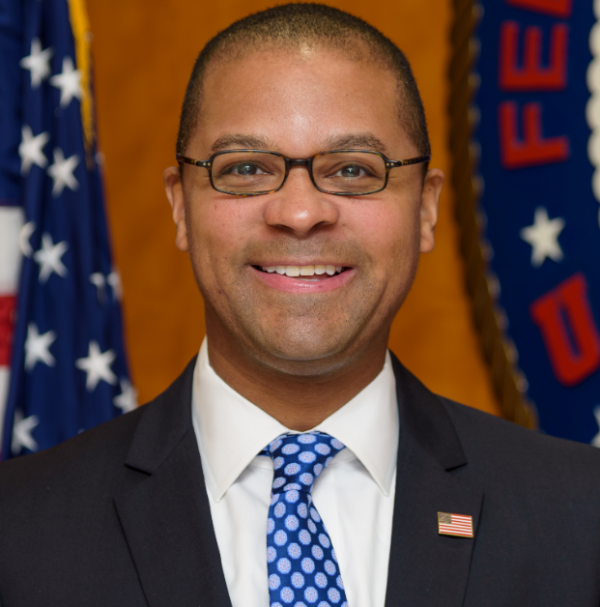FCC's Starks: Diverse Speech is Key Element of Free Speech

The smarter way to stay on top of broadcasting and cable industry. Sign up below
You are now subscribed
Your newsletter sign-up was successful
FCC commissioner Geoffrey Starks says only when the FCC and the nation does more to diversify media voices can broadcasting be said to uphold its responsibilities to the First Amendment and a free press.
That was the gist of his speech at the Media Institute's annual Free Speech America Gala.
"The First Amendment is not self-executing," he told his audience. "Preserving its guarantees requires the vigilance of regulators, the media, and the public alike."
Starks said America's broadcasters "should look like America," but that, according to the most recent FCC figures, of the 1,300 full-power TV stations licensed in that America in 2017, only 12 are owned by African Americans.
He lays much of that blame on the FCC. "The need for a greater focus on diversity and inclusion has never been more apparent, and the Commission has, largely and over many decades, failed in meeting its statutory goals and obligations in this regard."
Starks said the FCC should look at a federal appeals court's rejection of broadcast deregulation--due to what it said was the FCC's failure to take its impact on diversity into account--as an opportunity to get it right this time. "The FCC has been given a golden opportunity to succeed where it has previously fallen flat," he said.
Related: Hill Dems Seek Restart of Diversity Reporting
The smarter way to stay on top of broadcasting and cable industry. Sign up below
Starks also said the FCC must do more to enforce EEO reporting, including rebooting a historic FCC data collection on diverse employment that has been in disuse for 15 years.
It has been well over a decade since the FCC collected information (form 395-B) from broadcasters on the gender and diversity of their staffs--stretching over Republican and Democratic Administrations--a point the FCC's Democratic commissioners made back in February when the FCC voted to eliminate an EEO reporting form.
The holdup has been whether or not to keep that info confidential, with the data collection suspended since 2004. The Dems say that should have been resolved by now, and should be resolved, and the form reinstated, before the FCC weighs in again on diversity. Starks agrees.
"[T]here are those that would argue that collecting data or adopting meaningful policies to promote diversity would be unconstitutional," he said. "I couldn’t disagree more. First, collecting and analyzing data is a core function of an expert agency, and having a better understanding of the industries that we regulate is also just common sense. Second, when it comes to designing programs that would help improve our stagnant and declining ownership numbers, we can target our efforts based on race, ethnicity, and gender, so long as we are careful and provide a well-supported reason for doing so."
Starks said that empowering those diverse voices is part and parcel of defending free speech. "[W]e must support the inclusion of marginalized voices in the national conversation," he says. "Only then can we claim to have upheld our responsibilities under our statute and secured the guarantees of First Amendment in the field of broadcasting."
Contributing editor John Eggerton has been an editor and/or writer on media regulation, legislation and policy for over four decades, including covering the FCC, FTC, Congress, the major media trade associations, and the federal courts. In addition to Multichannel News and Broadcasting + Cable, his work has appeared in Radio World, TV Technology, TV Fax, This Week in Consumer Electronics, Variety and the Encyclopedia Britannica.

